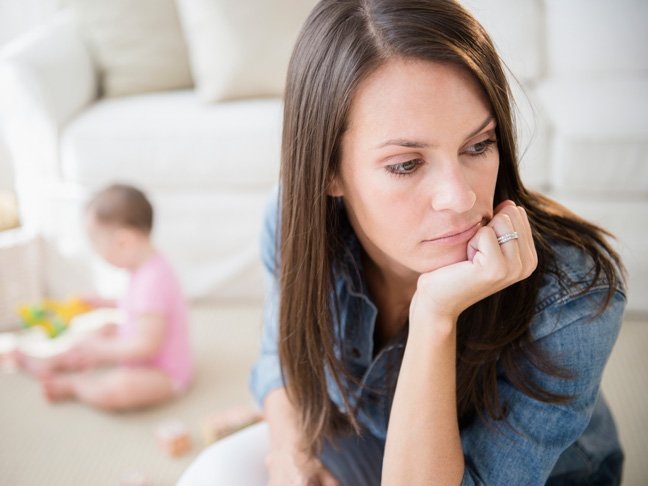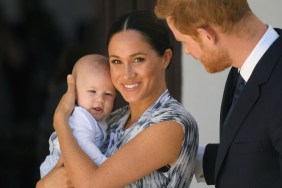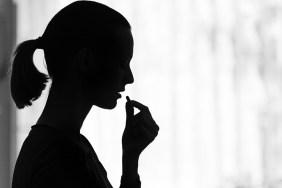I suffered from postpartum depression after I had my first baby. It went unrecognized for a few months, and it was rough on me and my family. I didn’t have negative feelings about my baby, nor did I have trouble bonding with him. I felt connected to him and loved him very much. But, I did feel incredibly overwhelmed and panicked over the littlest things: “What if he poops in public?” “What if my husband leaves for the day and then the baby cries for hours?” “What if he won’t go to sleep?” I also resented my husband; life for him seemed totally normal, whereas my life felt like it was falling apart. I got irrationally angry with him over the littlest things (once literally over spilled milk).
My experience with postpartum depression made me hesitant to have a second child, because I didn’t know if I could go through it again. Once I got better (thanks to therapy and medication) and a couple years passed, however, I decided I was ready to have another baby. I gave birth to my second child and everything was wonderful! I didn’t experience postpartum depression, motherhood was easier, and breastfeeding was easy.
Life was good — until I weaned my baby after nine months of breastfeeding. Within a couple of days after I had completely stopped breastfeeding, it was as if someone had flipped a switch in my brain and my world turned upside down. I was wrestling with anxiety, depression, extreme sadness, irrational fear, and frustration. I felt extremely overwhelmed by the littlest tasks: a day alone with both of my children, trying to get dinner ready, and sometimes even just getting up in the morning. It was as if I dove head first into my old postpartum depression almost a year after giving birth.
The end of my breastfeeding journey happened around the same time that I got my first period (some women do not menstruate for months while breastfeeding). Looking back, my hormones were clearly all over the place. But, at the time, it just seemed like I turned into a huge b*tch overnight. Once again, I felt irrationally angry about small things and I resented my husband. When my older child was misbehaving, I had no patience. It didn’t exactly make me a sympathetic person. Also, I didn’t understand what was happening to me, so I couldn’t explain my mood swings to my family. I wondered how had I gone from happy and at peace to angry, sad, and resentful in just a few short weeks.
In fact, according to a survey by the Centers for Disease Control, 8 to 19 percent of women reported having frequent postpartum depressive symptoms. No such surveys, however, have been done yet for post-weaning depression.
I called my doctor and she told me that some women experience “blues” after they wean their babies. She said that it probably wasn’t postpartum depression, which can occur as late as a year after a baby is born, and that my symptoms would go away within a couple weeks. I knew what I was feeling was more than “blues,” so I went online to find more information about what I was going through. Most everything I read, however, talked about post-weaning “blues” in the same way that my doctor did. I didn’t see much that sounded like what I was experiencing. I wasn’t just sad because I was no longer nursing. It wasn’t that I missed that time with my baby or that I wasn’t ready to wean. It was like I woke up as a completely different person — one that I didn’t like and didn’t want to be; I felt trapped inside of a stranger.
Then I remembered an article that I had read last year written by another mom struggling with post-weaning depression, and I went back and reread it. It was as if I was reading about my own experience. I also went back and re-read what I had written about the postpartum depression I suffered with my first child. There were similarities, but my post-weaning depression was different in many ways. For example, instead of feeling bad all of the time, it was as if I was on an emotional roller coaster. Sometimes I felt fine — almost “normal” — and then suddenly I would feel so overwhelmed it was debilitating. I would go from happy to hopeless in minutes. I felt as if my family would be better off with a different wife and mother. I felt like something was wrong with me for not feeling happy and capable, especially because so many other women out there seemed to be completely happy and capable of doing the same job I was doing.
The lack of awareness about post-weaning depression didn’t help, either. I can’t tell you the number of times people said: “Cheer up!” Or, “Look at your baby and be happy!” Or, the ever-annoying, “Just relax!” Saying those things to someone who is struggling with depression is not helpful; in fact, hearing that stuff made me feel even worse. All depression is misunderstood but postpartum and post-weaning depression are especially hard because both conditions hit women at a time when other people insist they should be happy — a time when they have to care for someone else when they barely have time to care for themselves.
I knew I couldn’t get through this ordeal on my own, so I saw another doctor. I received a prescription for talk therapy and an antidepressant. While I didn’t end up taking the medication this time — I was able to get through my depression with counseling — I can say that medication really helped me the first time around; had things not leveled out, I would have tried medication again.
It’s been two months since my post-weaning depression hit. Although I still feel overwhelmed at times, as every mom does, I no longer feel hopeless, out of control, irrational, or terribly sad.
So to the doctors, partners, families, friends, and other mothers out there, I just want to say that post-weaning depression is real. And it is rough. It isn’t a choice, nor is it a person being dramatic. It isn’t your wife being difficult or needy or b*tchy. It is a real condition that she is suffering from (and I do mean suffering) and she needs all of the help, understanding, and support she can get.
If you are suffering from post-weaning depression like I was, talk to someone. If your ob-gyn isn’t helpful, go see another doctor (Postpartum Support International is a great resource for referrals). You are not alone. There is help out there.
Related posts:
How to Avoid Post-Weaning Depression
Why We Need to Keep Talking About Postpartum Depression
More on Postpartum Depression








